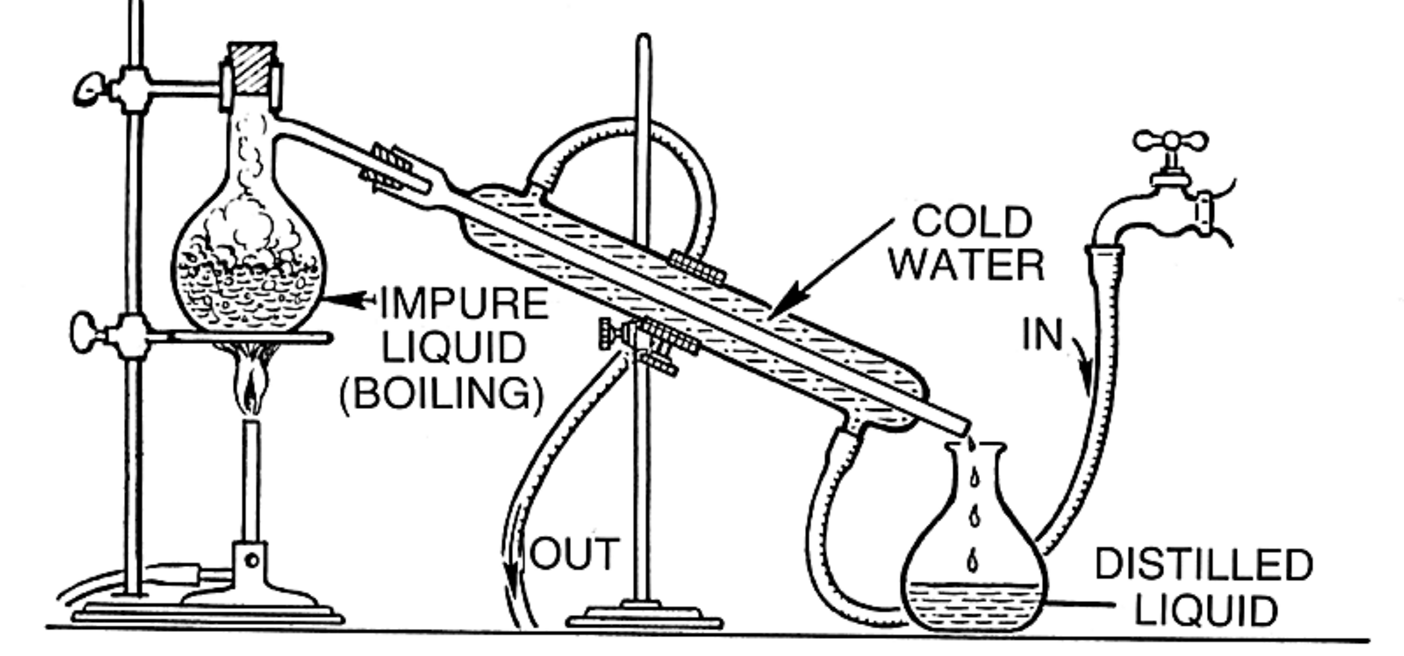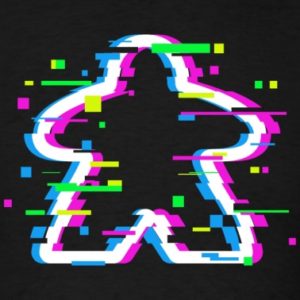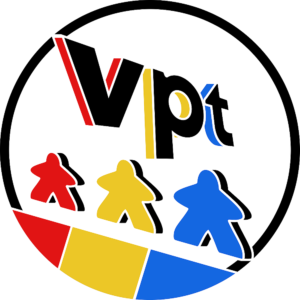It’s been one helluva summer. As I head back full-time to my position as Associate Dean at the University of Wisconsin-Stout, I look back over the past 3-4 months in awe. It was the pandemic summer that none of us will ever forget (even though we all wish we could). While that’s definitely the case for me as well, there’s another aspect that will always stick in my mind – it was the summer that I virtually playtested the heck out of Distilled, using Tabletop Simulator. I participated in numerous online playtesting groups, ran the game dozens of times at conventions, and furiously updated things based on feedback from players.
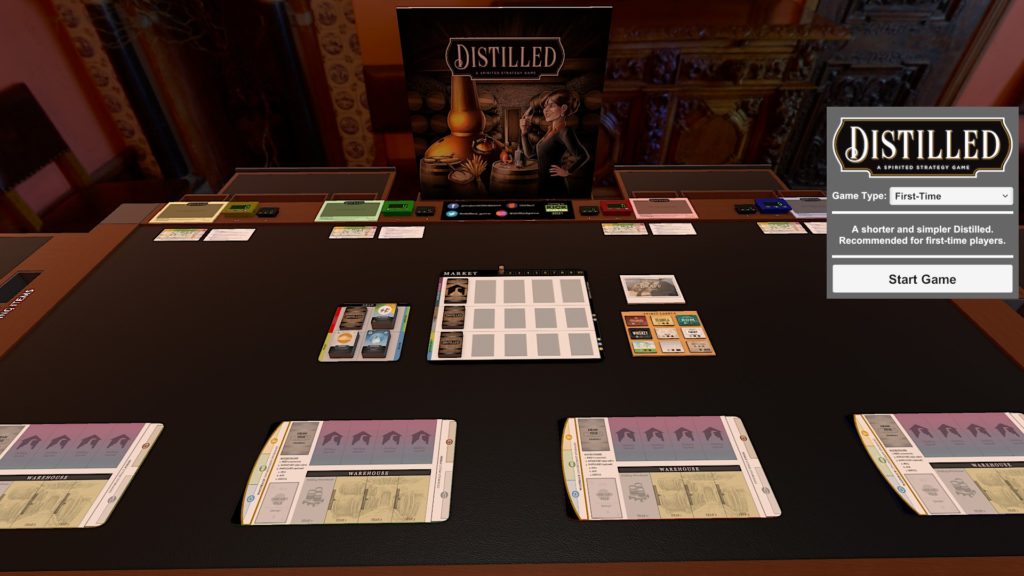
The version of Distilled that I uploaded to the Steam Workshop in early July was the result of heavy spring and early summer playtesting online. I was happy with the state it was in, and excited to have it played by people around the world. As of this post, that version is still up on the workshop, and has over 475 unique subscribers (people who have downloaded the game). But, within a few days of uploading it to the workshop, I hit a wall – or maybe a better way to put it was that I hit a wall in the dark, but then found a massive lightbulb to turn on, which helped me find a ladder that successfully led me up and over the wall.

Here’s what happened: I was playtesting the version I had just uploaded with a group called #RPT (remote playtesting) who meet every Tuesday and Saturday on Discord. It consists of a bunch of designers who all bring their games to the virtual table, to have them playtested – while also providing feedback to others for their games. I had participated in a few of these already, including a great one out of the United Kingdom called #VPT (virtual playtesters) and some other smaller ones as well. It’s a great way to throw a rough prototype out there for people to react to and comment on (and even tear apart, in some cases).
It was at this #RPT meetup, where Distilled was being played, that I hit that wall. Near the end of a playtest session, the game’s designer takes some time to ask the players questions and hear their feedback as well. Often times, you’ll get a mix of compliments and constructive criticism for improvement, which is great. But every so often, there may be an individual who throws caution to the wind and just “tells it like it is”. I had this happen – a designer/playtester proceeded to tell me all the things that were wrong with my game, in unfortunately a somewhat rude tone and delivery – how slow it played, how it wasn’t really a deckbuilder, how unengaging it was, and so on (he even went so far as to list all the things that he did while he was waiting on his turn to come back around, which included getting a drink, surfing the internet, and reading some blog posts). All of that was very hard to hear – it is essentially hearing someone taking what you’ve worked so hard on, and dismissing it almost completely. Rather than argue or make excuses, I politely thanked him for his time and feedback, and moved on to other games by designers in which to play and provide feedback.
The rest of the day absolutely sucked. I started second guessing myself for the decisions I’d made over the past few months, as most people had said that they really enjoyed the game. I wondered if it was the nature of Tabletop Simulator – that my game actually needed an in-person experience to work well. I started worrying about the future of this game, and how I had already partnered with and hired an artist who was busy working on the graphic design and illustration for the game. I went to bed that night in a pretty down mood, not sure where to go next.
“…he didn’t dance around the issues or cloak his criticisms in compliments – he communicated his feedback in a raw, brutal process that drove right down to the core of the flaws in my game’s systems.”
But I couldn’t sleep. At all. I was wide awake, turning that individual’s comments around in my head over and over again, trying to figure out why it was getting to me so much. Then, at around 3am, it hit me. He was absolutely right – everything he said was true. The game wasn’t a deckbuilder (or if it was, it was a poor one), the game played slow between turns, and the players didn’t feel engaged (sometimes not even at the beginning). Although his delivery on critique wasn’t great, it also might have been that approach that stuck with me – he didn’t dance around the issues or cloak his criticisms in compliments – he communicated his feedback in a raw, brutal process that drove right down to the core of the flaws in my game’s systems.
I was up for the rest of the night, brainstorming new ideas on how to solve these new, difficult design problems. And while the initial new Distilled v3.0 was mainly crafted that night (just like I created the original in a similar furious, insomnia-filled all-nighter back in October of 2019 in Scotland), I’ve been working to refine that new version for the past two months, with a great deal of scripting help from my friend, Seth Berrier, and I’m excited to finally share it with the public, in a new update to the Steam Workshop that is also full of new art and design from Erik, hopefully coming later this month.
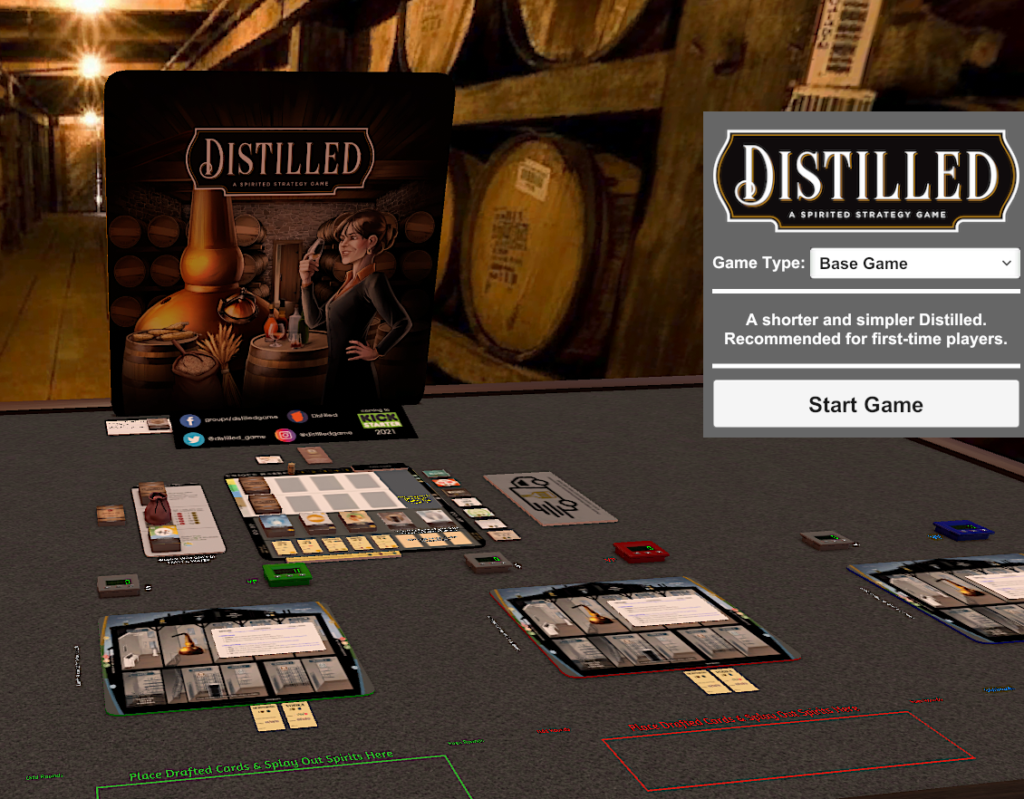
Over the next few weeks, I’ll be updating the blog with a summary of the most substantial changes, including:
From Deck Building to Card Drafting – The game with deckbuilding elements has now evolved in to one that has a card draft every round, which also alters the game’s phases/turns, Market purchases, and income tracking system.
Creating Simple & Complex Versions – The game now has a friendly and simplified “first-time game” experience, for those who just brought it back from the FLGS and broke open the shrink wrap. Because of this, the game also has advanced modules and variants for returning players, seeking to have more complexity in their session. All shipped in the base box.
Market Changes – The central part of the table in Distilled now includes having the players purchase recipes (to be able to make spirits), a new “Distiller’s Co-op” for basic and tradeaable goods (aptly named thanks to one of my online friends, Errin, who has a cool Cigar Game you should check out on the Game Crafter), flavor cards playing a larger role than just “pure flavor”, and the balance of value between drafted cards and unique cards found in the market.
Distillery Playermat Changes – Updates include dropping the shelf off the right side, having it double sided (for intro and advanced games), having the starting distillery identities being more thematic and prominent, including multiple warehouses, adding a “spirit label bonus track” and incorporating a “pantry” to carry cards over from round to round.
My wife thinks I’m insane. Most of my friends think I’m nuts. Even my artist and co-collaborator, Erik Evensen, likely thinks I’m a bit odd for doing all of this. But I’m truly just trying to refine the game into the most successful version of itself, by stripping unnecessary mechanics away while honing the elements that are successful, to be even more so.
So, check back soon to find out more about how I’ve truly attempted to “distill Distilled“, and I hope it will inspired you to try the new version out for yourself when it becomes available on the Steam Workshop sometime soon!
